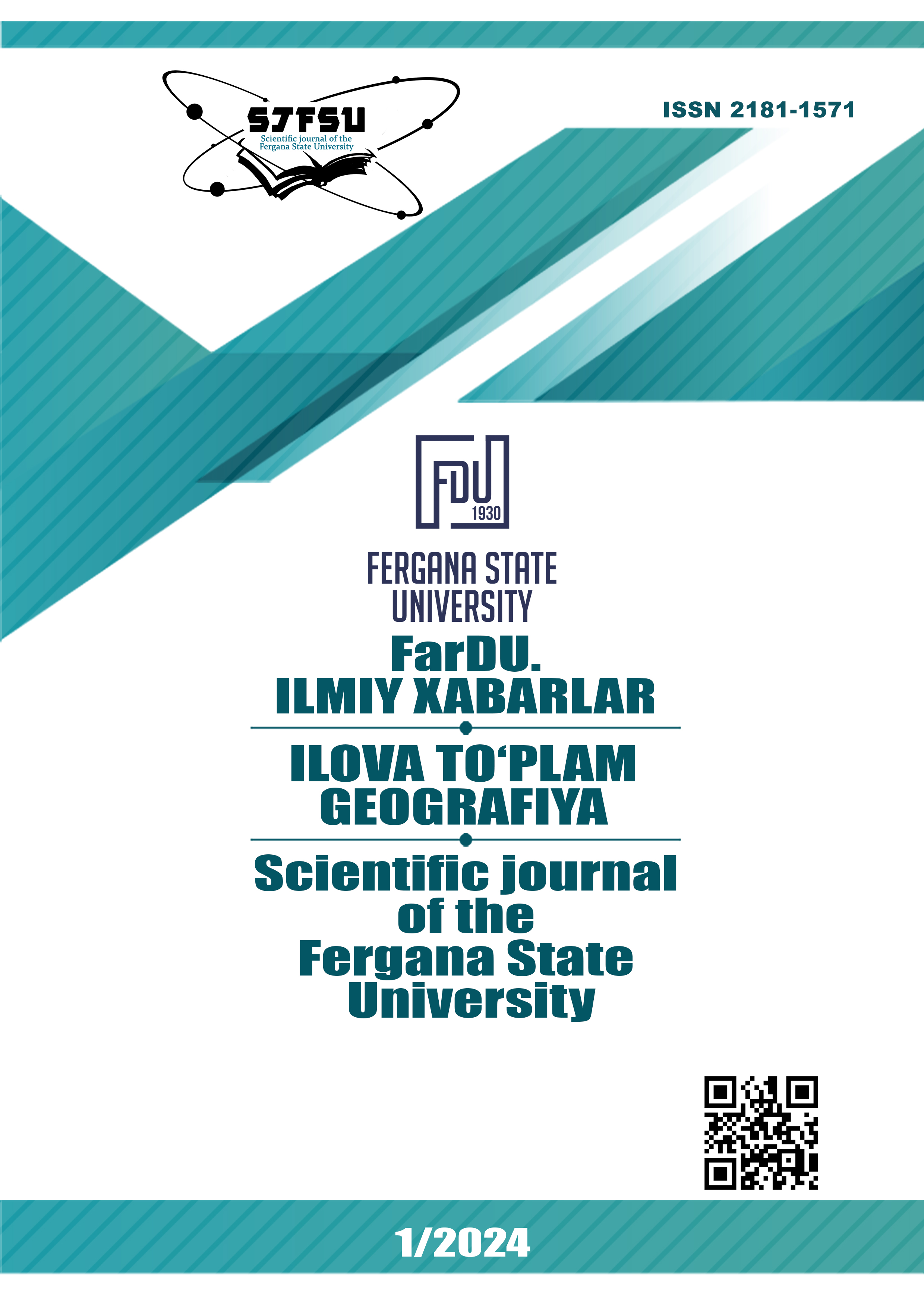THE ROLE AND IMPORTANCE OF THE POPULATION FACTOR IN SOME THEORIES OF TERRITORIAL ORGANIZATION
Keywords:
territorial organization, territorial organization of the population, population settlement, theory of settlement, territorial systems, settlement models, specialization, settlement, favorable territories.Abstract
The article examines unique theories that emerged as a result of the development of the sciences of economic geography and regional economics, starting from the 19th century. In particular, among them the leading theories devoted to issues of territorial organization are analyzed, based on the essence of the geographical location in each organization. Of course, based on the human factor, which is considered the main reason for any organization in modern society, it is justified that the population (man) is always at the core of the organization, and that the process of organization is carried out from the worldview of a person and his interests (economic, social, environmental). The article also discusses important ideas and theories in matters of territorial organization of the population.
References
Агафонов Н.Т. Государственная стратегия регионального развития России: смена парадигмы территориальной организации общества. Санкт-Петербург. Издательство ЗАО “Центр стратег. анализа обществ. процессов”. 1998 г. 52 с.
Аҳмадалиев Ю., Абдувалиев Ҳ. Фарғона водийсида аҳоли жойлашувини ландшафт омили асосида такомиллаштириш. Монография. “Classic” нашриёти, Фарғона, 2021. 140 б.
Вебер, Ал. Идеи к проблемам социологии государства и культуры / Ал. Вебер. – Москва : Директ-Медиа, 2007. – 340 с.
Гранберг А.Г. Основы региональной экономики. – М.: ГУВШЭ, 2001
Солиев А. Ҳудудий мажмуаларнинг назарий асослари. – Тошкент: Университет, 2007. – 92 б.
Чернавский Д.С. Базовая динамическая модель экономики России: инструмент поддержки принятия решений / Д. С. Чернавский, Н. И. Старков, А. В. Шчербаков. М.- 2001. 19 с.
Шумпетер Й. История экономического анализа. — СПб.: Экономическая школа, 2004. — С. 613.
Axtell, Robert L. Zipf distribution of US firm sizes. American Association for the Advancement of Science (2001). Архивированоиз оригинала 23 сентября 2015 года.
Launhardt W. Theorie des Trassierens Teil I, Schmorl, von Seefeld, Hannover. 1887.
Downloads
Published
Issue
Section
License
Copyright (c) 2024 Scientific journal of the Fergana State University

This work is licensed under a Creative Commons Attribution-NonCommercial-NoDerivatives 4.0 International License.
How to Cite
Most read articles by the same author(s)
- , "MODERN COMMENTARIES ON SOCIOLINGUISTIC RESEARCH" , Scientific journal of the Fergana State University: No. 3 (2024): Scientific journal of the Fergana State University. Application set (Social humanities sciences)
- , , , ASSESSMENT OF REPRESENTATIVENESS AND EFFECTIVENESS OF THE SYSTEM OF PROTECTED NATURAL AREAS , Scientific journal of the Fergana State University: No. 1 (2024): FarDU ilmiy xabarlar jurnali ilova to‘plam (GEOGRAFIYA)
- , , SEPARATION OF SURKHANDARYA REGION INTO LANDSCAPE TYPES AND ITS SIGNIFICANCE IN AGRICULTURE , Scientific journal of the Fergana State University: No. 5 (2024): FarDU.Ilmiy xabarlar jurnali (Aniq va tabiiy fanlar)
- , , , THE ROLE AND SIGNIFICANCE OF GEOGRAPHICAL TERMS IN NATURE CONSERVATION , Scientific journal of the Fergana State University: No. 1 (2024): FarDU ilmiy xabarlar jurnali ilova to‘plam (GEOGRAFIYA)
- , , METHOD OF LAND CAPACITY AND DETERMINATION OF POPULATION DENSITY IN THEM , Scientific journal of the Fergana State University: No. 4 (2024): FarDU.Ilmiy xabarlar jurnali (Aniq va tabiiy fanlar)
- Ahmadaliyev Yusufjon Ismoilovich, Fattoxov Ne’matullox Abdulxakim o‘g‘li, FACTORS OF POLLUTION OF THE GEOECOLOGICAL CONDITION OF AGGLOMERATIONS (ON THE EXAMPLE OF FERGANA-MARGILAN AGGLOMERATION) , Scientific journal of the Fergana State University: No. 3 (2024): FarDU.Ilmiy xabarlar jurnali. Ilova to'plam (Aniq va tabiiy fanlar)
- , , METHODS OF STUDYING ECOLOGICAL FUNCTIONS OF GEOGRAPHICAL NAMES , Scientific journal of the Fergana State University: No. 2 (2023): Scientific journal of the Fergana State University (Exact and natural sciences)
- , , , , , INVЕSTIGАTIОN ОF THЕ KINЕTIСS ОF Сr(VI) IОN SОRPTIОN FRОM АRTIFIСIАL SОLUTIОNS ОN INDUSTRIАL АNIОNITЕ , Scientific journal of the Fergana State University: No. 5 (2024): FarDU.Ilmiy xabarlar jurnali (Aniq va tabiiy fanlar)
- , , , , , SEPARATION OF THERMALLY STABLE SALTS FROM METHYLDIETHANOLAMINE USED IN THE PURIFICATION OF NATURAL GASES FROM SOUR GASES , Scientific journal of the Fergana State University: No. 1 (2025): FarDU ilmiy xabarlari jurnali (TABIIY FANLAR)
- , , , THE NEED FOR A GEOGRAPHICAL APPROACH TO AN INTEGRATED STUDY OF LAND RESOURCES , Scientific journal of the Fergana State University: No. 1 (2024): FarDU ilmiy xabarlar jurnali ilova to‘plam (GEOGRAFIYA)

